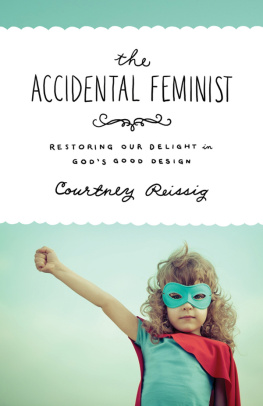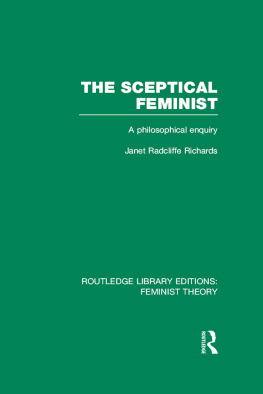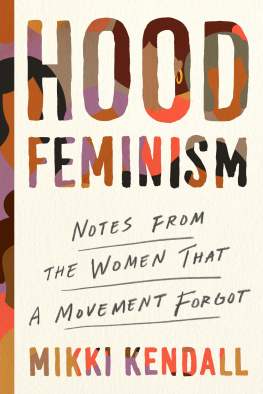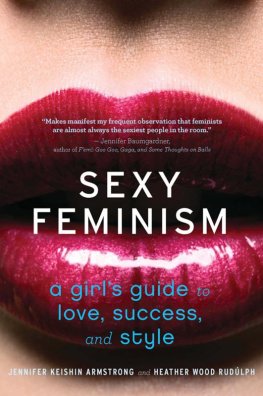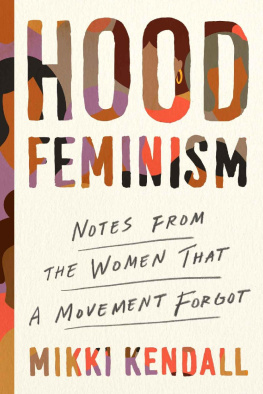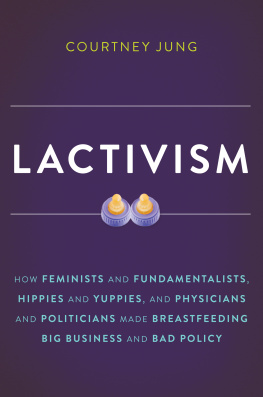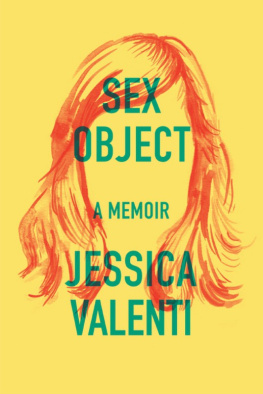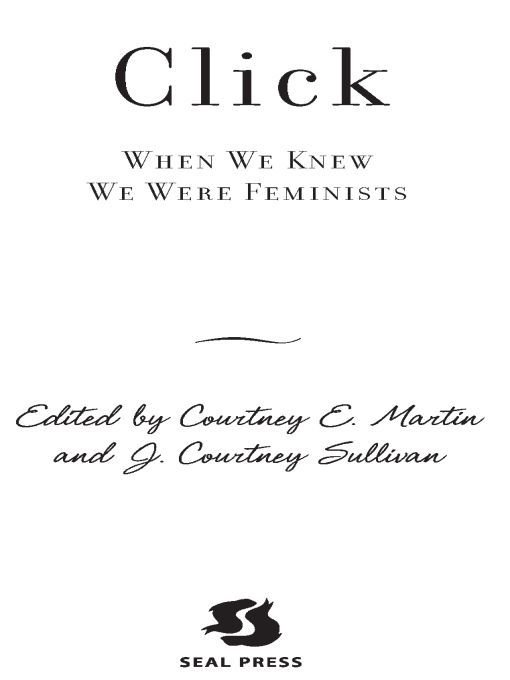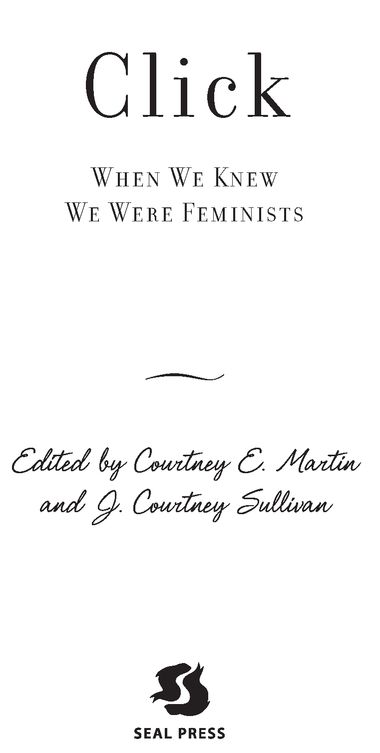Table of Contents
For our fathers, Ronald M. Martin and Eugene F. Sullivan Jr.
Courtney E. Martin and J. Courtney Sullivan
INTRODUCTION
Click. The flipping of a switch. The cartoon bulb flashing on overhead. The light suddenly illuminating the darkness. This romantic notion that ideas and identity are formed in one lightning-strike moment used to be the purview of old, white guysGreek philosopher Plato, whose metaphor for enlightenment involved escaping creepy shadows in a cave, and inventors, like Alexander Graham Bell and Eli Whitney, who swore their earth-shattering insights happened suddenly and by accident once upon a time.
Jane OReilly reclaimed the click for the ladies in her 1971 Ms. magazine cover story entitled The Housewifes Moment of Truth. Appearing in the inaugural issue, it opened with a group of women lying on the floor in Aspen, floating free and uneasy on the indoor/outdoor carpet, eyes closed, being led through the first phase of a Workshop in Approaching Uni-sexuality.
The women recognize the click! of recognition, that parenthesis of truth around a little thing that completes the puzzle of reality in womens mindsthe moment that brings a gleam to our eyes and means the revolution has begun. The backdrop of OReillys story is distinctly early 70s, and the realizations that occur on that (no doubt, shag) carpet seem somewhat fixed in time, too. One by one, the women OReilly describes realize that they can no longer tolerate the sexism all around. She writes:
In Houston, Texas, a friend of mine stood and watched her husband step over a pile of toys on the stairs, put there to be carried up. Why cant you get this stuff put away? he mumbled. Click! You have two hands, she said, turning away.
Last summer I got a letter, from a man who wrote: I do not agree with your last article, and I am canceling my wifes subscription. The next day I got a letter from his wife saying, I am not cancelling my subscription. Click!
Last August, I was on a boat leaving an island in Maine. Two families were with me, and the mothers were discussing the troubles of cleaning up after a rental summer. Bob cleaned up the bathroom for me, didnt you honey? she confided, gratefully patting her husbands knee. Well, what the hell, its vacation, he said, fondly. The two women looked at each other, and the queerest change came over their faces. I got up at six this morning to make the sandwiches for the trip home from this vacation, the first one said. So I wonder why Ive thanked him at least six times for cleaning the bathroom? Click! Click!
We began our own conversation about click moments in a definitively modern contexta mass email sent to several of our feminist friends. J. Courtney Sullivan was in the process of writing her novel, Commencement, and needed an idea for the feminist aha moment of one of her characters. She emailed a group of women and asked, What was the moment that made you a feminist? Was there one person, event, book, or idea that made it happen? The responses came in fast and furious. Some were predictable (reading Katie Roiphe, joining the campus womens center, having a sexual assault experience) and some were anything but (seeing Jennifer Baumgardner wearing fishnet stockings, or Alissa Quart falling in love with a war correspondent). Our click moments were distinctly different from those Second Wavers in OReillys essay.
Responses to our email chain included:
We were reading The Great Gatsby in high school English, and I came across this line: Thats the best thing a girl can be in this world, a beautiful little fool. I felt enraged, but none of my classmates even seemed to notice.
Was it The Feminine Mystique? Catharine MacKinnon? Attending Smith and realizing that I needed to do more with my life in order to honor the legacy of the women who came before me? Weeping for prostitutes in Amsterdam? My Come to Jesus moment was kind of like a slow buildup over time that culminated with me waking up one morning a RAGING feministalthough I was definitely a minor one from the start.
At a rainy Take Back The Night rally my first year of college... I looked around at the women on every side, and thought about how strange it was that Id ended up here, given my conservative Republican upbringing. I realized that if I dont identify as a feminist, no one really does.
One movie: Girls Town. Amazing.
Courtney E. Martin, inspired by the range and surprising nature of many of the answers, suggested that we ask more young feminists that same question. We wanted to collage together a picture of contemporary young feministsoften invisible to mainstream media entirely and sometimes maligned by their own foremothers for supposedly misinterpreting the movement theyve inherited. We wanted to discover what it is that still brings a diversity of young people to try on the feminist label despite the obvious risks. And we wanted to represent what we saw as the awesome breadth of feminist baptisms in the modern age. Back in the day, the most common path toward a feminist identity was getting dragged to a meeting by a friend or reading a feminist book. Today, a girl Googles Jessica Simpson in her living room in Dubuque and stumbles on a feminist analysis of Simpsons creepy dad on a blogsuddenly, shes wondering if she might be a feminist, too.
Click is a collection of essays on the catalytic moments when twenty-eight women and one man in their teens, twenties, and thirties were disoriented by sexism and found their way to feminism. From protest marches to marching bands, Anita Hill to Patricia Hill Collins, late night stand-up to purity pledges, ADHD to engineering school, Barbie dolls to Sleater-Kinneythese essays depict a definitively modern version of feminism, reshaped and reinvigorated by the daughters of the 80s and 90s. Their stories and backgrounds are diverse, but they share a passion for feminism that proves the movement is as strong as ever.
In these pages, you will hear from some of the most beloved and controversial voices in contemporary feminismincluding Jessica Valenti, Jennifer Baumgardner, Amy Richards, and Rebecca Traisteras well as some fresh new perspectives from writers like Sophie Pollitt-Cohen, the whip-smart daughter of Katha Pollitt; the youngest Feministing editor, Miriam Zoila Prez; and eighteen-year-old Nellie Beckett, who says, Buying a pair of sturdy, sensible black boots was a classic feminist milestone... I developed a confident stride that carried me farther, faster, more powerfully than I dreamed possible. One day, I put a pair of flats back on. I had to mince down the street with that booty-shaking hobble that so many girls learn after theyve forgotten how to run and jump. Some advice, girls: Once you get a decent pair of shoes, theres no going back.
The inspirational moments, people, and events that draw young women to feminism are everywherebut this generation of the movement faces many challenges that others never did. First off, we face the question, is feminism still necessary? Some of our contributors speak to the idea of always supporting womens rights, yet not initially feeling the need to ally themselves with a formal movement. American women in their twenties and thirties have benefited immensely from inroads made by our mothers and grandmothers, and a by-product of this is that many young people see feminism as outdated and unnecessary. Here, we reveal what changes their minds.


